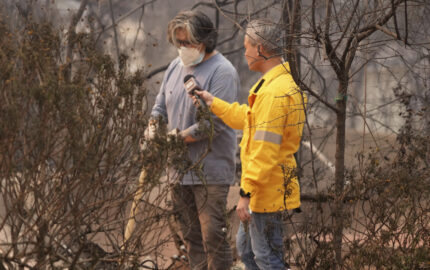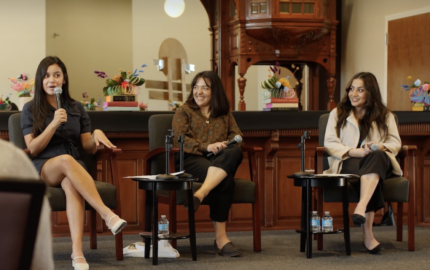
On January 21st, officers of the Royal Canadian Mounted Police (RCMP) searched the Toronto home of Juliet O’Neill, a reporter with the Ottawa Citizen. They also searched her desk at the paper’s city hall bureau. The RCMP’s search warrant alleged that O’Neill violated Section 4 of the Security of Information Act by using secret documents to report a story about Maher Arar, a Syrian-born Canadian citizen, arrested in the United States as a suspected al-Qaeda terrorist.
The RCMP conducted its criminal investigation in an effort to learn the identity of O’Neill’s sources in obtaining information from the secret documents. The newspaper’s owner, CanWest Global Communications Corp., launched a court challenge against the raid on O’Neill’s home and office, attacking the constitutional validity of Section 4. According to CanWest attorneys, this section “jeopardizes and interferes with journalists’ ability to receive information from confidential sources on matters of grave public concern and importance.” This criminal offense carries a 14-year prison term.
On January 23, a story O’Neill wrote about the experience of having her home searched was published in The Citizen. O’Neill’s words are reprinted below with the express permission of “Ottawa Citizen Group Inc.,” a CanWest Partnership.
My house is small, a downtown gem, close to cafés and the art gallery, my family and closest friend, a private sanctuary—until the doorbell began ringing over and over, insistently, on Wednesday morning. There are six rooms in my little house. There would be more than one Royal Canadian Mounted Police (RCMP) person per room to rifle through the intimate stuff of my life.
When the doorbell rang, I peered out through my bedroom blinds, a tiny movement I would later discover was among the details recorded, in elegant handwriting, in Staff Sgt. Gary Legresley’s notebook. He jotted it down when I peered out at 8:12 a.m. and again at 8:16 a.m. He was the New Brunswick officer in charge of a five-hour search of my Ottawa home conducted by 10 RCMP investigators. My office at City Hall was being searched at the same time. I discovered this by phoning a colleague who had been locked out of the Citizen’s office. It had been deemed a “crime scene.”
A group of RCMP from New Brunswick had been seconded to Ottawa for an investigation into the leak of a document pertaining to Maher Arar. Staff Sgt. Legresley told lawyer Wendy Montgomery, who came to my home, that the New Brunswick contingent has been living at a hotel in Ottawa for a month.
When I asked if I had been under surveillance, I was told yes, I had been, for some weeks.
Before I answered the door, I decided to have a shower and get dressed. I had a wild hope that the men on my stairwell, and the people I could barely make out inside the unmarked police cars parked in my driveway, would be gone by the time I had dried my hair. By the time I got out of the shower, the doorbell ring was incessant and the phone was ringing, too. The normally cheerful sounds of my household seemed ominous. I tied my wet hair back, went downstairs and pulled up the front blind. Then I answered the door.
Staff Sgt. Legresley showed his ID through the window. I opened the door. Two others entered with him. I didn’t let them close the door behind them completely at first. Already it felt crowded, a little stifling. The seven other officers followed after I had been handed and read the search warrant, read my rights, and given time to call a Citizen lawyer. I was told I could make the call in private, but an RCMP officer would have to be nearby.
Two of the 10 RCMP were women, one a computer wizard who straight away accompanied me to my laptop computer, saying the first important thing was to get me offline—in case I had alerted someone who could remove files from a remote location. I have a dial-up connection to the Internet, and I wasn’t online. She told me that she, too, has a dial-up connection at home, that since she spends all day in front of a computer at work, who needs a full-time connection at home?
The other RCMP woman will be remembered as “the underwear lady.” It was no comfort that she, and others, wore white gloves as they went about their business. She rummaged through my lingerie drawer, my socks and t-shirts, jewelry, cosmetics and hair mousse, handbags, clothes closets, pockets, shelves of sweaters, linens and towels. It was when I saw her pulling back the quilt on my bed that I felt shock. I realized I did not wish to express my emotions and so held them in check. I went back downstairs for another chat, this time with Staff Sgt. Robert McMillan.
Staff Sgt. McMillan’s card said he was a program manager from the “Truth Verification Section” of the RCMP’s Behavioural Sciences Branch. He was the man who proposed that since the search would take several hours, he and I should just leave them to it and drive to his office where we could talk in a more serene setting about a leaked document and the source for it. I had reported the contents of the document in a story about the Maher Arar case on November 8th.
I told him I couldn’t leave my home full of strangers.
I’ve never been robbed, but people who have been robbed tell of feeling violated that persons unknown have rifled through their things and taken the valuable bits away. That was how it felt: like a slow-motion robbery. It took five hours.
Every once in a while, Staff Sgt. McMillan said it was going well. He was pleased with the pace and, when it was almost done, he sat down with lawyer Wendy Montgomery and me to say his piece again. “The most intrusive part is over,” was how he started.
The press corps began gathering in my driveway soon after I alerted an editor and the Citizen lawyer what was happening. The word spread quickly. As the press crowd grew, my emotional armour hardened. My phones began ringing off the hook. Each time I looked out, my distress eased. I felt protected by the sight of all the reporters and photographers from the Citizen, Global TV, CBC, CTV, The Globe and Mail, and other news outlets. I felt sorry that they had to stand outside in the bitter cold and thought of one of the inside jokes of the news business: “Hurry up and wait.”
I was surprised when an RCMP officer offered to move the media mob, already restricted away from the house, even farther away. “Those are my friends and colleagues,” I told him. When one of them closed a blind against the long lens of a camera, I immediately opened the blind back up. He didn’t look me in the eye but he smiled and went back to taking my laptop apart on the dining room table. I realized that the RCMP group inside my home was fortified by two RCMP outside, one to keep the press at bay, the other a “media liaison officer” to appear on camera.
During the search Staff Sgt. McMillan explained that this was part of a “high level investigation.” They were looking for a document and who leaked it to me. “My understanding is that you will be charged with an offense,” he told me. The search warrant specified three offenses under the Security of Information Act, which boil down to communicating and receiving secret information and possessing a secret document. A lawyer later told me the maximum sentence on conviction is 14 years in prison. “Ultimately it’s going to be your decision where you want to go with this,” Staff Sgt. McMillan said. He said he had been investigating for two months, the document had passed through many hands in many departments and too many people were under suspicion. “We want to put this to bed,” he said. “I’m not pussyfooting around.”
There was a strange combination of order and chaos during those five hours. My only small act of defiance was to drink a coffee without offering one to everyone else. One of my cats, Purra, pitched in by brushing up against the cat lovers among them, leaving tufts of white hair on freshly pressed black pants. One of the RCMP men who politely removed his shoes knocked over the cats’ water bowl and didn’t respond when I asked if his feet were soaked. I wiped the water up and gave Purra a pat on the head.
Wayne Lang was the assignment man, telling who to work in which room. During a burst of small talk about pets, I mentioned that my cats were from Moscow, where I had been posted for a few years for Southam News. Insp. Lang said he had been there when I was there, on RCMP detail during a visit by then Prime Minister Brian Mulroney. It was too long ago to remember his face, but for a moment I thought I did. What a small world.
The major target—three of them went in together—appeared to be my home office: my laptop and Filofax, files, notebooks, cassette tapes, address books, contact lists, bookshelves, photo albums, newspaper clippings, tax files and utility bills, bank and mortgage statements, letters, and my wooden box of treasured mementoes from anniversaries and other special occasions, and love letters from my great friend, James. I cringed when I saw them reading postcards and old letters from pals who now use e-mail. I’d left a pile of photos from an outdoor family birthday party on my desk. I wished they wouldn’t look at them.
My office is cozy. I can see the steeples of the cathedral through the window when I’m writing at home. It was too cosy for them. The two experts in such things, the young woman and a young man, took my laptop down to the glass dining table and proceeded to take it apart with cute, miniature tools. When I caught a glimpse of what they were doing with the tools, their own laptops and a jungle of wires and imaging devices, I had to push away a surge of anger.
They honoured my request to please not seize my laptop on condition they copied the hard drive for seizure. They seized two copies of the hard drive, along with a box of notebooks, address books, contact lists, and microcassette tapes, all neatly packed in plastic envelopes, like blood samples at a medical lab. The material they carted away from my home and office are the tools of my trade: names, phone numbers, written and recorded notes. It left me feeling stripped.
I will remember what happened to me as part of how the post 9/11 world works. Some Canadians of Muslim faith and Middle Eastern origin have told of the early morning knock on the door from the RCMP. Because of my everyday work as a journalist, I’ve now experienced myself something that I realize would be more difficult to endure without a lawyer, without knowing my rights, and being confident of media attention.
When they entered, one of them videotaped the entire house. That was so that they could tape it before they left and prove they had not ransacked the place, if it ever came to that. They did put things back in order, except my bookshelves were dishevelled and here and there were envelopes of floppy discs from the dinosaur era. I had told them they were so old they were of no value. They apparently agreed.
When it was over, Staff Sgt. Legresley thanked me for cooperating. Not that I had a choice, I thought. I shook his outstretched hand and said: “I can’t bring myself to thank you.”


